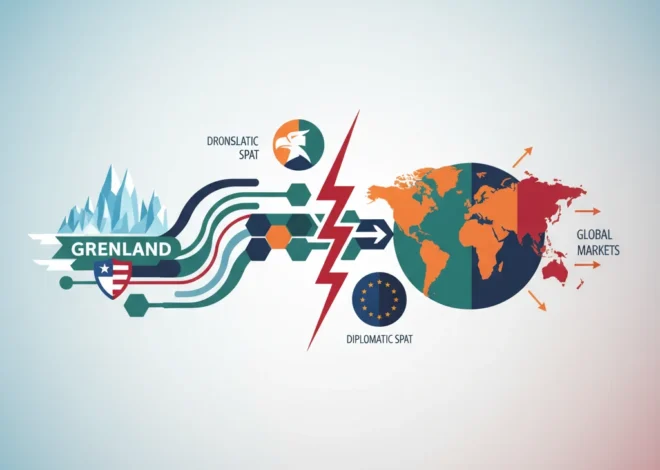
A High-Stakes Gambit: US Weaves Politics into South Africa’s Economic Lifeline
The New Frontier of Trade: When Domestic Policy Meets Global Economics
In the intricate dance of international relations, trade negotiations are the carefully choreographed routines that underpin the global economy. They are typically a world of tariffs, quotas, and market access—a landscape measured in dollars and tonnage. However, the latest chapter in US-South Africa trade relations is veering off-script. Washington is reportedly introducing sensitive domestic South African policies, namely Black Economic Empowerment and land reform, into discussions about the future of a vital trade agreement. This move, highlighted by South Africa’s Justice Minister Ronald Lamola at the FT Africa Summit, transforms a standard economic negotiation into a complex geopolitical chessboard, with profound implications for finance, investing, and the future of Africa’s most industrialized economy.
At the heart of this dispute is the African Growth and Opportunity Act (AGOA), a cornerstone of US-Africa trade policy. For over two decades, AGOA has provided eligible sub-Saharan African countries with duty-free access to the lucrative US market for thousands of products. For South Africa, this is not a trivial matter. It’s an economic lifeline that supports tens of thousands of jobs, particularly in the automotive and agricultural sectors. The potential renewal of AGOA, or a new superseding agreement, is therefore a high-stakes affair. The injection of politically charged domestic issues into these talks signals a significant shift in US foreign policy, blurring the lines between commerce and political ideology and creating a new layer of risk for investors and business leaders to navigate.
Understanding the Core Conflict: AGOA, B-BBEE, and Land Reform
To grasp the gravity of the situation, it’s essential to understand the three pillars of this conflict: the economic incentive (AGOA) and the two deeply sensitive domestic policies (B-BBEE and land reform).
AGOA: More Than Just a Trade Deal
The African Growth and Opportunity Act was signed into law in 2000 as a means of fostering economic growth and development in Africa. It’s a unilateral trade preference program, meaning the US grants these benefits without demanding reciprocal tariff reductions. In 2022, South Africa exported goods worth over $2.7 billion to the US under AGOA and the related Generalized System of Preferences (GSP) program. These exports, ranging from vehicles and wine to citrus fruits and steel, are critical drivers of the national economy.
The renewal of this pact is crucial. Its expiration would immediately render key South African exports less competitive, potentially leading to factory closures, job losses, and a significant blow to the country’s already fragile economy. This dependency gives the US considerable leverage—leverage it now appears willing to use to influence South Africa’s internal policy direction.
The following table illustrates the significance of the trade relationship, showcasing the top traded goods that form the backbone of this economic partnership.
| Category | Top U.S. Exports to South Africa (2022) | Top U.S. Imports from South Africa (2022) |
|---|---|---|
| Vehicles & Parts | Vehicle Parts, Trucks | Passenger Vehicles, Vehicle Parts |
| Minerals & Metals | Copper | Platinum, Diamonds, Iron & Steel Products |
| Machinery | Excavation Machinery, Computers | Industrial Machinery |
| Agricultural Products | Poultry Meat, Wheat | Citrus Fruits, Wine, Tree Nuts |
| Chemicals | Chemical Products | Inorganic Chemicals |
Data synthesized from the Office of the United States Trade Representative.
B-BBEE and Land Reform: Redressing Historical Injustices
The policies the US is reportedly targeting—Broad-Based Black Economic Empowerment (B-BBEE) and land reform—are not simple economic regulations. They are foundational pillars of South Africa’s post-apartheid identity, designed to address centuries of racial and economic inequality.
- B-BBEE: This policy aims to increase the participation of Black South Africans in the economy through measures like promoting Black ownership in companies, affirmative action in management, and preferential procurement. For proponents, it’s a moral and economic imperative. For some critics, including certain international businesses, its implementation can be complex and is sometimes viewed as a barrier to investing.
- Land Reform: This seeks to correct the historical imbalance in land ownership, where the white minority continues to own a disproportionate amount of land. The debate around “expropriation without compensation” is one of the most contentious issues in modern South African politics, touching upon property rights, historical justice, and food security.
For the South African government, these policies are matters of national sovereignty and social justice. The suggestion that they should be negotiated with a foreign power is seen as an unacceptable intrusion. As Minister Lamola stated, “You can’t link the domestic policies of a sovereign country… to trade,” arguing that such issues should be addressed through diplomatic channels, not as preconditions for economic partnership (source).
Anatomy of a Meltdown: How a Rogue Trader Cost Nestlé a Fortune
The Ripple Effect: Implications for Finance and Investment
When geopolitics collides with economics, the financial markets are the first to feel the tremors. This standoff introduces a significant level of uncertainty that affects every aspect of the investment landscape in South Africa.
Currency and Market Volatility
The South African Rand (ZAR) is notoriously sensitive to political and economic news. The uncertainty surrounding the future of AGOA could trigger significant volatility in forex trading. A negative outcome—or even prolonged, contentious negotiations—could lead to a sharp depreciation of the rand, increasing import costs and fueling inflation. This, in turn, impacts the stock market, as a weaker currency and unstable economic outlook can deter foreign portfolio investment, which is a critical component of the JSE’s liquidity.
Foreign Direct Investment (FDI) and The Banking Sector
Long-term investors, particularly those in manufacturing and agriculture, rely on stable, predictable trade relationships. The automotive sector, for example, has invested billions in South Africa, partly on the premise of duty-free access to the US market. If that access is threatened, future investment decisions will be re-evaluated. This directly impacts the banking and finance sectors, which underwrite these large-scale projects. Banks will have to reassess the risk profile of loans to export-oriented industries, potentially tightening credit and slowing economic growth. The entire investment thesis for South Africa hinges on its role as a stable gateway to the continent, a reputation this dispute puts at risk.
Financial Titans Sound the Alarm: Are We on the Brink of a New Lending Crisis?
A Test for ESG Principles
This situation also presents a fascinating and complex case study for the world of ESG (Environmental, Social, and Governance) investing. On one hand, B-BBEE and land reform are, at their core, social initiatives aimed at correcting historical injustices—a goal that aligns with the ‘S’ in ESG. On the other hand, the US is framing its concerns in the language of property rights and a level playing field for investors, which aligns with the ‘G’ (Governance). This conflict forces investors to weigh competing social and governance priorities and decide which principles to champion, highlighting the often-complex trade-offs inherent in ESG frameworks.
The Path Forward: A Bellwether for US-Africa Relations
The resolution of this issue will have consequences far beyond South Africa’s borders. It will set a precedent for how the United States engages with African nations in an era of renewed great power competition. Will the US use its economic might to enforce political and ideological alignment, or will it pursue partnerships based on mutual respect for sovereignty? African nations are watching closely.
For business leaders and finance professionals, the key takeaway is the increasing politicization of the global economy. Supply chains, trade agreements, and investment flows are no longer governed by pure market economics. Geopolitical risk, once a niche concern, is now a central variable in every major financial decision. The complex interplay of trade, domestic policy, and international diplomacy in the US-South Africa talks is not an anomaly; it is the new normal. Navigating this landscape requires a deeper understanding of the political currents shaping our interconnected world, where a policy debate in Pretoria can directly impact a trading desk in New York.
The Shinobi Strategist: Ancient Ninja Tactics in Modern Finance and Investing
Ultimately, this standoff is a reminder that the global financial system is built on a foundation of political agreements. When that foundation is shaken by disputes over sovereignty and national identity, the entire economic structure is at risk. The challenge for both Washington and Pretoria is to find a path that protects their core interests without demolishing a partnership that has, for decades, delivered tangible economic benefits to both sides.


